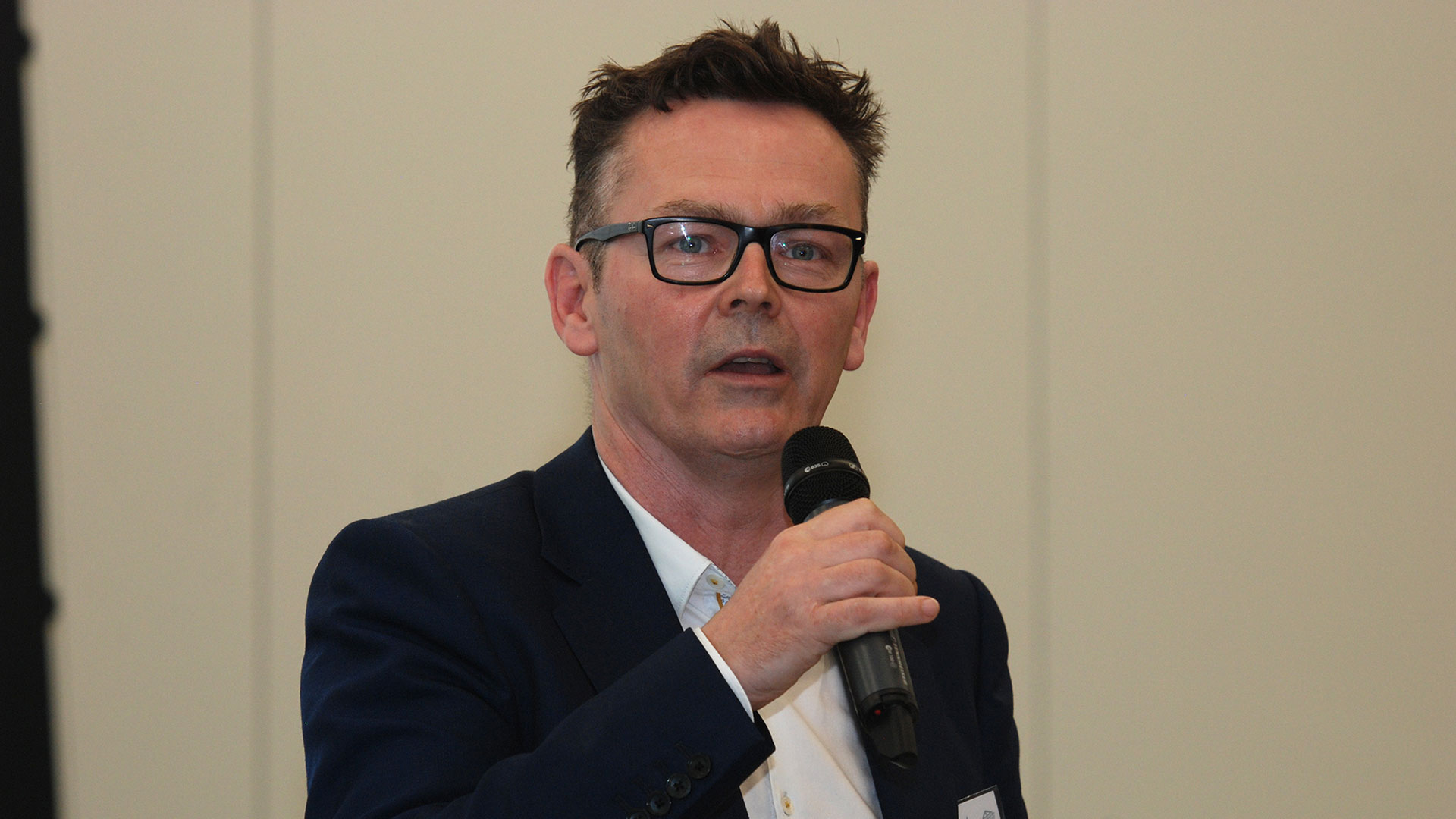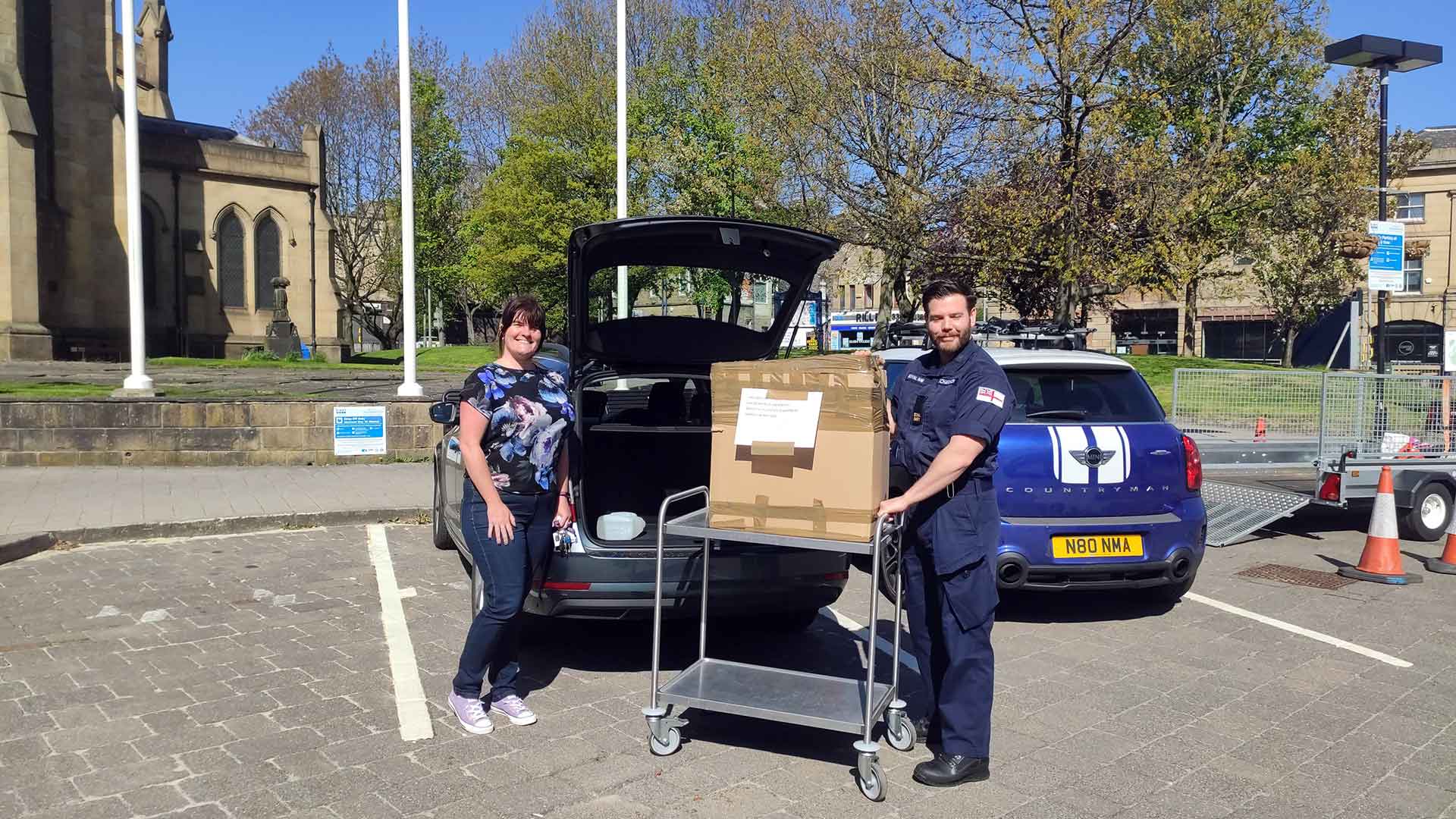
Annual Review 2020
Innovative

Research predicted anti-COVID steroid benefits
Dr Hamid Merchant and Dr Syed Shahzad Hasan assessed the results of using corticosteroids such as dexamethasone on hospitalised COVID-19 patients with acute respiratory distress syndrome (ARDS) who were on respiratory support.

Scientists get to grips with COVID-19
The University has awarded funding to a research team that aims to provide a head start in developing drugs that will combat future pandemics.

Physical and mental health tele-health scheme
Huddersfield has pioneered an audio-visual telehealth-coaching service that has helped older people preserve and boost their physical and mental health with 32 students and eight lecturers.

Health staff need training for COVID-toes
Dr Leanne Atkin, a vascular Nurse Consultant and senior lecturer, has sounded the alarm on a newly-identified symptom of the coronavirus.

Latest COVID-19 study shows young people worried
Dr Andrew Mycock, Reader in Politics, who has helped analyse the data from a research project that aimed to appraise the impact of the virus on UK youth.

Pregnancy and COVID-19 lessons so far
Professor Padam Simkhada and PhD researcher Pasang Tamang have co-published an article titled “Pregnancy and COVID-19: Lessons so far” on the current knowledge of the effect of COVID-19 on pregnant women and babies.

DNA sampler loaned to Government for COVID-19 test
The University aided the campaign against coronavirus by providing high-tech equipment to boost the Government’s goal to ramp up the virus-testing regime and with the donation of large quantities of protective gear for frontline health workers.

Huddersfield research predicted anti-COVID steroid benefits
A study from early in the global coronavirus pandemic that evidenced the benefits of using steroids to combat COVID-19 in severely ill patients could have saved lives, according to the Huddersfield researchers involved.
Dr Hamid Merchant and Dr Syed Shahzad Hasan assessed the results of using corticosteroids such as dexamethasone on hospitalised COVID-19 patients with acute respiratory distress syndrome (ARDS) who were on respiratory support.
By mid-April they had found that the proportion of COVID-19 patients who died in the steroid group was significantly lower compared to those who did not receive corticosteroids, at 28 per cent vs. 69 per cent. Their research has now been published in the Expert Review of Respiratory Medicine following a lengthy period of scrutiny and peer review.
The Huddersfield academics’ work highlights the issues involved in scrutinising scientific evidence, as well as costs involved in research and the UK’s preference for evidence-based practice. Oxford University’s RECOVERY trial came to similar conclusions to the Huddersfield researchers in mid-June, leading to the UK government’s decision that dexamethasone could be made available to patients, a move being followed around the world.
The World Health Organisation (WHO) had, early in the pandemic, recommended that steroids should not be used to combat CoViD-19 due to perceived risk of delayed coronavirus clearance. Despite warnings from WHO, various global bodies acknowledged the mortality benefits of using steroids on COVID-19 patients with ARDS, such as the National Health Commission & State Administration of Traditional Chinese Medicine (NHC), Surviving Sepsis Campaign (SSC), and the National Institute of Health (NIH).
“There is always a dilemma of the risks versus the benefits of evidence-based practice in a medical emergency,” says Dr Hasan.
Dr Merchant adds that, “The benefits of using steroids outweighs the risks. There is a risk that the immune system may go down and there is a possibility of delayed viral clearance from the body, but this is a risk worth taking if it saves lives.
Read full story

Scientists get to grips with COVID-19
The University has awarded funding to a research team that aims to provide a head start in developing drugs that will combat future pandemics.
Equipped with newly-acquired software, the project will carry out computational analysis of the structure of some of the proteins that are involved in SARS-CoV-2, the virus that causes COVID-19. This greater understanding can open the way to drug development, said Dr Chris Cooper, a senior lecturer in the Department of Biological and Geographical Sciences.
“There are a lot of similarities between SARS-CoV-2/COVID-19 and the last SARS [severe acute respiratory syndrome] virus,” he continued. “And as future pandemics may involve other coronaviruses, if we understand their biology in advance and if it has similar proteins, that means it may actually give us a head start.
“If you understand the biology you can potentially have additional lines of attack for future pandemics.”
The University of Huddersfield has established a “pump priming” research fund for projects dealing with the current pandemic. Dr Cooper is the academic lead for the project titled SARS-CoV-2 in silico protein modelling and determination of novel therapeutic drug candidates to treat COVID19.
His collaborators are departmental colleagues Dr Richard Bingham, Dr Patrick McHugh, of the Department of Pharmacy, and Dr Ed Bolt, of the University of Nottingham.
Their bid for funding was successful and has enabled the purchase of ICM Pro software that helps to predict and analyse the structure of proteins. The team can deploy X-ray crystallography approaches to gain greater understanding of the biological science behind the virus.
Read full story

Physical and mental health tele-health scheme helps lone elderly
The lockdown has made an impact on the wellbeing of vulnerable people, even if they have avoided coronavirus. However, Huddersfield has pioneered an audio-visual telehealth-coaching service that has helped older people preserve and boost their physical and mental health.
Launched on 1 June 2020, in collaboration with Age UK Wakefield District, the new service drew on the expertise of students and their lecturers in the twin disciplines of occupational therapy and physiotherapy. Older people who were able to use audio-visual technology took part in six sessions over three weeks and received specially-tailored advice and encouragement.
Bethan Hebberd, who lectures in physiotherapy at the University and is one of the clinicians who have developed the project, explained that at a very early stage in the pandemic she and her colleagues, including Head of the Division of Health and Rehabilitation, Dr Benita Powrie, realised the effect it was having on health and wellbeing beyond the virus itself.
“Older people and those with significant health conditions were having to isolate and that ciould have secondary issues around mental and physical health. We realised that the NHS is having to focus on keeping people alive, so we thought about how we could help people who are alone, suffering from poor health.”
The answer was to pilot a new tele-coaching service, in which students – supervised by their qualified clinician lecturers – offered advice via audio-visual links.
A collaboration was developed with Age UK Wakefield District, the leading charity for older people. It located potential users of the service and circulated them with referral forms that provided the Huddersfield students and lecturers with the data they needed to launch the individualised audio-visual sessions.
Some 32 students and eight lecturers took part in the project. It was unique because it delivered health coaching via video call from a combination of two disciplines – occupational therapy and physiotherapy.
Read full story

Huddersfield research predicted anti-COVID steroid benefits
Dr Leanne Atkin, a vascular Nurse Consultant and senior lecturer, has sounded the alarm on a newly-identified symptom of the coronavirus. Dubbed COVID-toes, Dr Atkin has witnessed a sharp increase in the amount of patients being referred to vascular clinics with similar symptoms to arterial disease and who then test positive for COVID-19. The dermatological manifestation known as COVID-toes was formally identified as being a symptom of COVID-19 in April by Spanish podiatrists and appears as asymmetrical lesions which can look very similar to chilblains. Patients can experience burning sensations, itching with pain or tenderness around the affected areas and do not seem to be in correlation with the severity of the illness. In other words, explained Dr Atkin, they can be seen on patients who have mild symptoms of COVID-19 and who go on to make a complete recovery within a couple of weeks, this includes the pain and discolouration in the feet returning to normal.
Since April, Dr Atkin has noticed an alarming rise in the number of patients requiring specialist vascular review with acute limb ischemia and perfusion injuries, all of which are related to the COVID virus. Acute limb ischaemia, Dr Atkin explains, is a restriction in blood supply to tissues and can cause a shortage of oxygen that is needed for cellular metabolism which keeps the skin tissue alive. If patients are not monitored closely to help prevent tissue loss it can result in them having to undergo limb amputation. In addition to the increased health risks imposed upon the patient if COVID-toes goes undiagnosed, the possible spread of infection is also greater.
Read full story

Latest COVID-19 study shows young people worried for their future
Today’s young people can be dubbed the “Coronavirus Generation” and the pandemic will have a long-lasting effect on their lives, according to Dr Andrew Mycock, Reader in Politics, who has helped analyse the data from a research project that aimed to appraise the impact of the virus on UK youth.
Findings include statistics which show that more than 90 per cent of young people were stringently observing the lockdown and that 80 per cent of them are seeking news not from social media but from traditional outlets, including ministerial briefings.
“We assume that the young have rejected these traditional forms of media. But the research shows that they don’t feel secure in navigating the social media world of ‘fake news’. Many young people are using traditional media – maybe for the first time – because they can consume it with a certain amount of reliability,” said Dr Mycock.
He has collaborated on the production of the 65-page report named Take the Temperature, compiled by the organisation Beatfreeks, which researches national youth trends.
During late March and early April it surveyed 1,535 young people, aged 16-25. It was found that 91% of respondents said that they are strictly adhering to government advice. But there are negative strains on young people’s family relationships and 65% of young people said they were worried about their mental health in light of Covid-19.
The report makes a series of recommendations, including a call for the Government to establish a National Young Person’s Response Unit. Also, local authorities and businesses need to build young people into their recovery task forces and there should be statutory digital citizenship education programmes to provide young people with the digital literacy to equip them for life in the ‘new normal’.
The published Take the Temperature report is now landing on the desks of policy makers and the Government needs to think about how it brings young people into debates as the country comes out of lockdown into a world that will be very different, continued Dr Mycock.
“We have made a strong effort to ensure that the people who make policies pick up on this report,” he added.
Read full story

Pregnancy and COVID-19 lessons so far
Professor Padam Simkhada and PhD researcher Pasang Tamang have co-published an article titled "Pregnancy and COVID-19: Lessons so far" on the current knowledge of the effect of COVID-19 on pregnant women and babies. The article states that so far little is known about the effect of COVID-19 on pregnant women and babies and the evidence for transmitting the virus from mother to baby is inconclusive. One study has shown some evidence that the virus can pass from an infected mother to her baby, but no major harmful effects have been recorded. The article includes advice to expectant mothers on how to avoid the virus. It includes postponing any social events such as baby showers.
Read full story

DNA sampler loaned to Government for COVID-19 testing
Huddersfield scientists responded to a request from 10 Downing Street for high-tech equipment in the Government's efforts to increase the testing of the public for coronavirus.
The University aided the campaign against coronavirus with the donation of large quantities of protective gear for frontline health workers, and also by providing high-tech equipment that will boost the Government’s goal to ramp up the virus-testing regime.
A network of facilities known as Lighthouse Labs has been established, but to scale up their work they needed larger numbers of advanced polymerase chain reaction (PCR) machines. These can take a tiny sample of DNA and amplify it so that it can be studied in detail. The School of Applied Sciences possesses a ThermoFisher 7500-Fast PCR machine, used for forensics courses. When a unit based at 10 Downing Street asked for the loan of the equipment, the School’s Dean, the biochemist Professor Michael Ginger, readily agreed.
“The Government is looking for PCR machines validated for use in a gold standard analytical context. There is only a finite number in the UK,” he said. It was taken away to aid the target of carrying out 100,000 COVID-19 tests every day.
The School of Applied Sciences examined all its resources, seeking any equipment that can be used to combat the virus. For example, several members of the School Technical Support Team acted quickly to identify PPE that could be sent and a cache of 1,500 disposable lab coats was handed over as personal protective equipment (PPE) for health workers at Huddersfield Royal Infirmary.
Several members of the School of Applied Sciences Technical Support Team acted quickly to identify the PPE that could be sent by the University.
Read full story